The Western Digital Black PCIe SSD (512GB) Review
by Billy Tallis on March 8, 2017 8:30 AM ESTRandom Read Performance
The random read test requests 4kB blocks and tests queue depths ranging from 1 to 32. The queue depth is doubled every three minutes, for a total test duration of 18 minutes. The test spans the entire drive, which is filled before the test starts. The primary score we report is an average of performances at queue depths 1, 2 and 4, as client usage typically consists mostly of low queue depth operations.
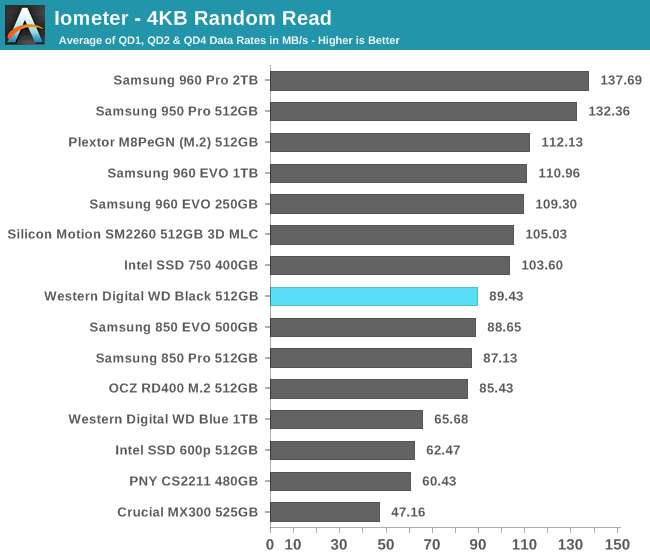
The WD Black just barely manages to deliver better random read performance than any SATA SSD, and among PCIe SSDs it also slightly beats the OCZ RD400 in addition to outperforming the Intel 600p as usual.
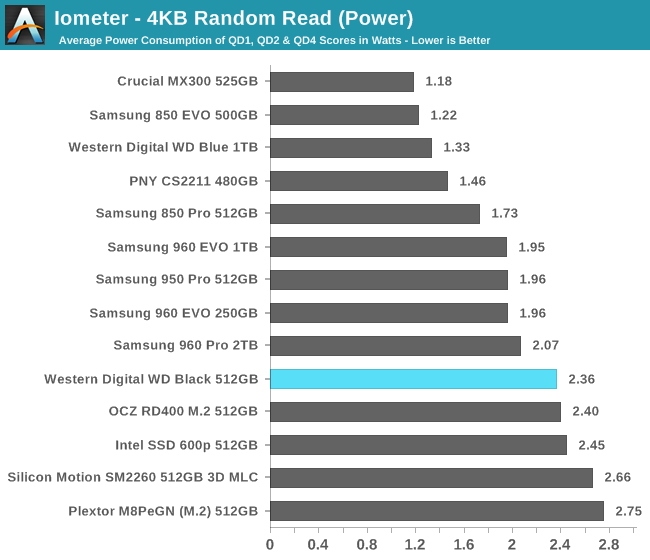
The WD Black's power consumption is the lowest among the non-Samsung PCIe SSDs, but its efficiency is still below average when SATA SSDs are considered, and it's only half as efficient as the Samsung 850 EVO.
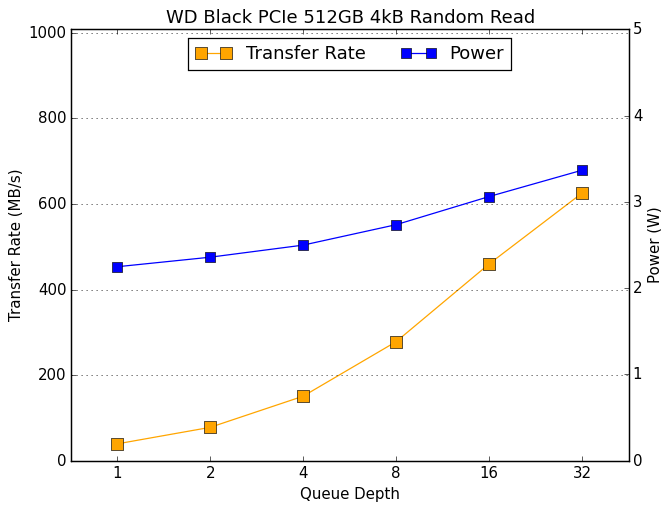 |
|||||||||
The WD Black has only a narrow random read performance advantage over SATA SSDs at low queue depths, but by QD16 it has scaled beyond the performance limits of the SATA interface. Power consumption starts out high but does not increase particularly steeply as the test progresses.
Random Write Performance
The random write test writes 4kB blocks and tests queue depths ranging from 1 to 32. The queue depth is doubled every three minutes, for a total test duration of 18 minutes. The test is limited to a 16GB portion of the drive, and the drive is empty save for the 16GB test file. The primary score we report is an average of performances at queue depths 1, 2 and 4, as client usage typically consists mostly of low queue depth operations.
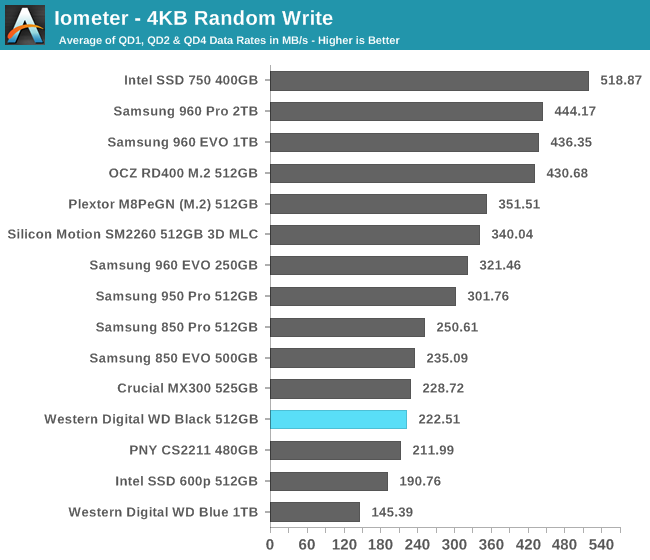
The random write performance of the WD Black is nothing special: it's much faster than the SATA-based WD Blue, but still not as fast as the SATA drives using 3D NAND.
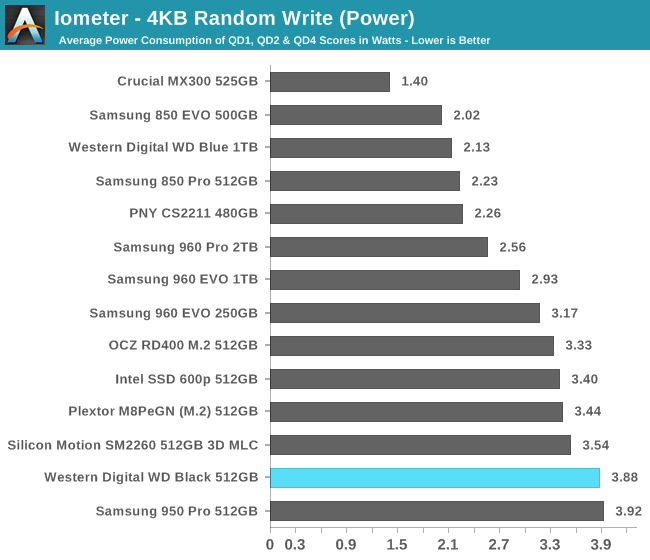
The power consumption of the WD Black is the second highest we've measured for this test and is close to 4W even at low queue depths. The efficiency is half that of the Samsung 850 EVO and barely a third that of the Crucial MX300.
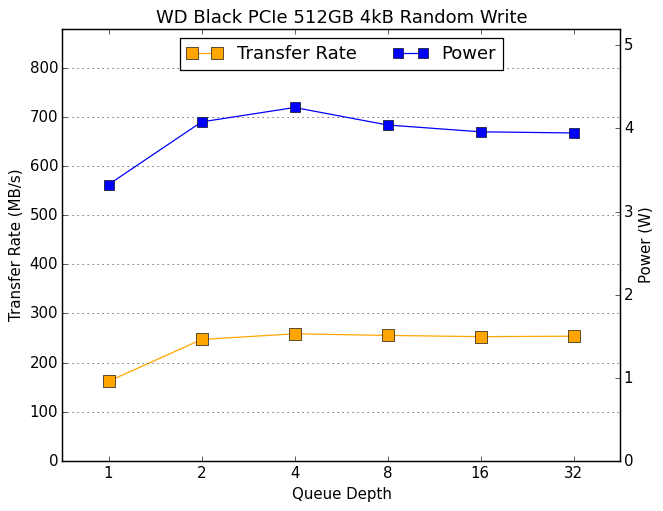 |
|||||||||
The WD Black is probably thermally limited in the second half of the test as power consumption drops back below 4W and performance ceases to increase with queue depth.










36 Comments
View All Comments
Gothmoth - Wednesday, March 8, 2017 - link
why would anyone buy this?if you want M.2 you want performance.. this is just crap.
GoMoeJoe - Wednesday, March 8, 2017 - link
Price according to mediocre performance.Glad to see WD entering the space though.
WinterCharm - Wednesday, March 8, 2017 - link
Horrible price to performance ratio... if you're going to gimp reads this much on an M.2 SSD, then at least give us 1TB for $200.herbc - Wednesday, March 8, 2017 - link
Noticed top end SATA 2.5 inch SSD's jumped in price considerably lately. Samsung 850 Pro 256 GB went from $129.00 to around $150.00 in a week.Magichands8 - Wednesday, March 8, 2017 - link
Pretty much none of these SSDs are worth buying until the prices get down to around $0.12/GB and even then with a proper form factor. I suppose if you're particularly desperate or require them for some special niche use-case they will serve a purpose, ignorance not withstanding, but otherwise I just don't see the point.TheinsanegamerN - Thursday, March 9, 2017 - link
At 39c/GB, most people are already seeing that SSDs are far superior to HDDs for a majority of use cases.Jad77 - Wednesday, March 8, 2017 - link
It's Blue, not Black.Makaveli - Wednesday, March 8, 2017 - link
I don't get WD they may performance competitive drives in the spinning HD space. Yet when is comes to SSD's and M.2, NVMe drives they are happy with being bottom feeders!I guess its probably "a day late a dollor short" meaning it took them so long to enter the market everyone else was already so far ahead.
creed3020 - Thursday, March 9, 2017 - link
That has been WD's slogan and approach to SSD based storage for years. We've been saying for years that HDD's relevancy will continue to shrink and if these giants want to survive into tomorrow then they need to innovate, which this product is clearly not an example of. Its barely an also ran.CoreLogicCom - Wednesday, March 8, 2017 - link
They just don't want to cannibalize the last remnants of their consumer hard drive business by producing SSDs that are faster than their hard drives...?